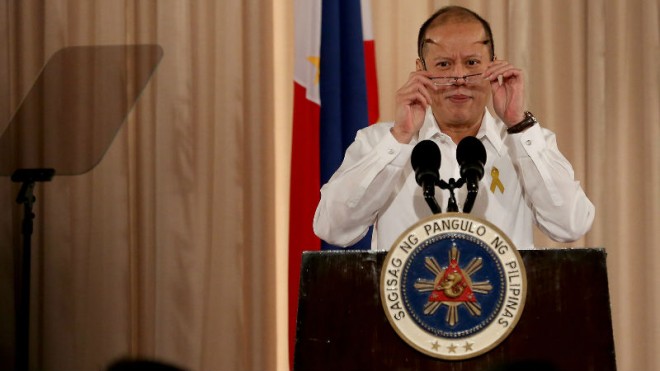PRESIDENT Aquino on Tuesday signed the P3.002-trillion General Appropriations Act (GAA) for 2016, proud that throughout his six-year term, his administration never reenacted a national budget, a practice made by his predecessor that was susceptible to corruption.
“Today we witnessed a historic chapter in our country, the enactment of the P3.002-trillion national budget for 2016. With the cooperation between the executive and congress and other institutions, we achieved another record. This is the sixth straight year that we passed the country’s budget on time,” President Aquino said in his speech.
Without naming his predecessor, former President now Pampanga Rep. Gloria Macapagal-Arroyo, Mr. Aquino explained that the practice of reenacting a budget always led one to ask where the money went.
“In 2007, for example, [the GAA] was approved in April. Is it not right that because it is a reenacted budget, the funds for the months when the budget has yet to be approved, and money has already been spent during these months, should be removed (from the budget)?” Mr. Aquino explained.
What was worse in the 2007 situation was that money had already been spent on items such as salaries, maintenance and other operating expenses (MOOE) and others from January to March and yet there was still funds earmarked for these three months, he said.
“Why were the items which were already paid still in the budget? Where did the excess funds go?” he pointed out.
A statement from the Department of Budget and Management (DBM) said social services, which covers housing, livelihood and community driven projects, account for P1.106 trillion or 36.8 percent of the budget.
Economic services that include infrastructure, agriculture, transport and communications account for P829.6 billion or 27.6 percent.
General public services have a P517.9 billion or 17.3 percent allocation.
Defense and security have the lowest budget allocation among all the sectors with P129.1 billion or 4.3 percent.
“Still, the allocation reflects a raise of 11.5 percent from 2015, to address the budgetary needs of AFP modernization, in light of the West Philippine Sea territorial disputes,” the DBM said.
Education
Mr. Aquino said the Department of Education (DepEd) has a P436.5-billion budget, still the biggest in the national budget.
The GAA earmarked P62.7 billion for the conditional cash transfer program called Pantawid Pamilyang Pilipino Program (4Ps), aimed at bringing assistance to 4.6 million beneficiaries, including the more than 218,000 families excluded in 2008-2009.
“These include the indigenous peoples and families living in the streets. Indeed, we made the most out of pouring funds in programs like these especially now that we are seeing their positive results,” Mr. Aquino said.
He reiterated that according to the Department of Social Welfare and Development (DSWD), the 4Ps have raised 1.5 million households or some 7.5 million Filipinos out of the so-called poverty line.
The President said the Department of Public Works and Highways (DPWH) has a P400.4-billion budget in 2016.
The funds will shoulder the completion of all national roads and flood-control projects.
“If this year we allotted 4 percent of our GDP (gross domestic product) for our infrastructure, next year, we aim to allot 5 percent of our GDP to this sector,” the President said.
For the government’s “Build Back Better” program, the GAA has earmarked P38.9 billion for the National Disaster Risk Reduction and Management Fund.
The President said this includes funds for the Yolanda Comprehensive Rehabilitation and Recovery Plan, the construction of additional evacuation centers and assessing the quality of public buildings to ensure the safety of the people during calamities.
Environmental protection
The 2016 budget is not just one that would give a boost to the country’s economy, but would also help make the country more resilient to the effects of climate change, according to Sen. Loren Legarda.
“This is a budget that will fund programs not only for economic development but also for the growth of every citizen; not only to create progressive communities but also to build resilience; not only to reduce poverty but also to promote sustainability,” said Legarda, chair of the Senate finance committee.
According to Legarda, special provisions in the budget reiterate the implementation of environmental laws.
The 2016 budget includes allocations for capacity building programs for the implementation of the Ecological Solid Waste Management act, a long-time unfunded law, she said.
There are also special provisions under the budgets of the Department of Interior and Local Government and the DPWH that state that these agencies must ensure the construction of green and resilient evacuation centers in every region in the country.
The Department of Environment and Natural Resources, aside from its current environmental programs such as the National Greening Program, would also implement a National Coral Restoration Program.
The DepEd and State Universities and Colleges must also integrate the following in their respective curricula: environmental protection and awareness, disaster risk reduction, climate change adaptation and mitigation, indigenous knowledge systems pertaining to agriculture, environment and cultural heritage.
Senate President Franklin Drilon said the 2016 budget was the largest so far and was needed to sustain the Aquino administration’s “propeople investment.”
